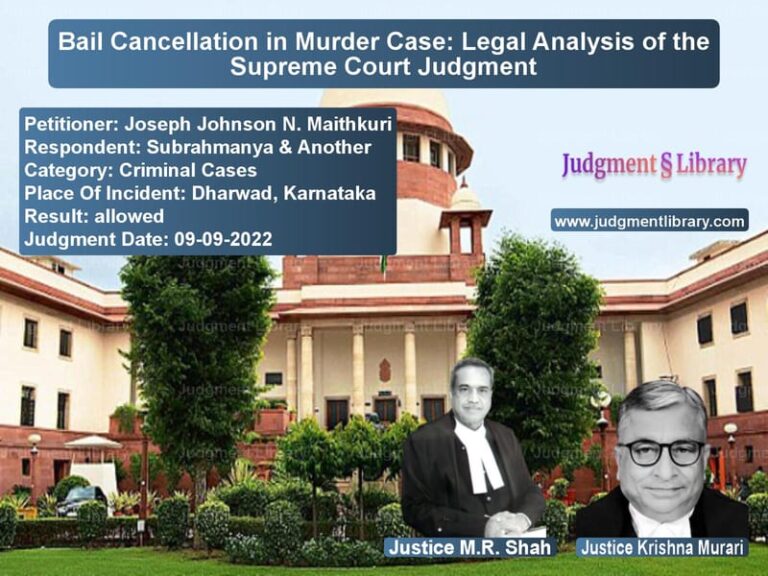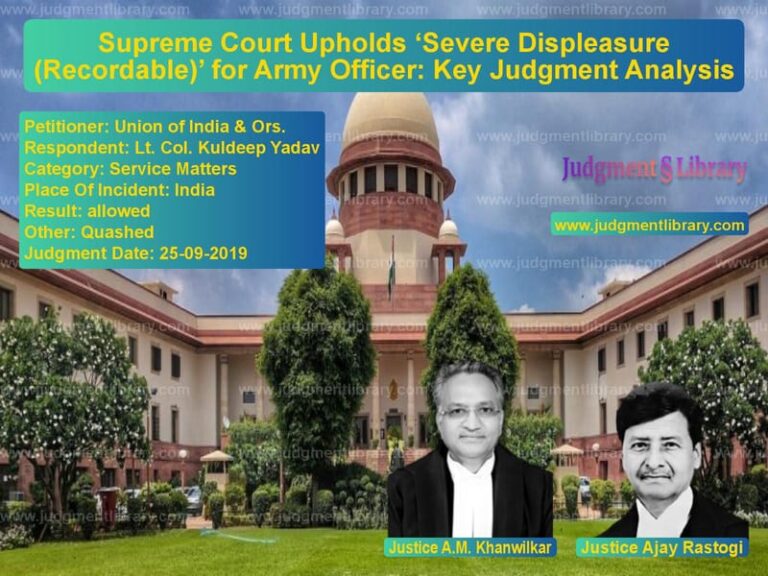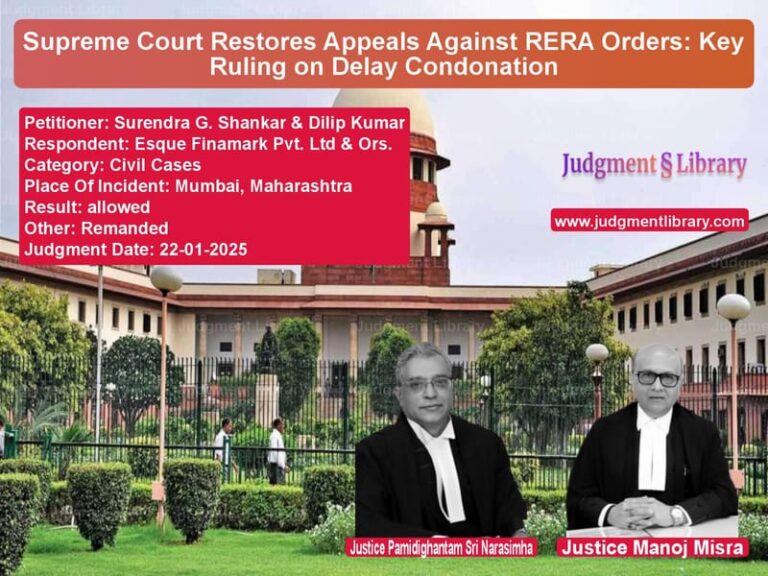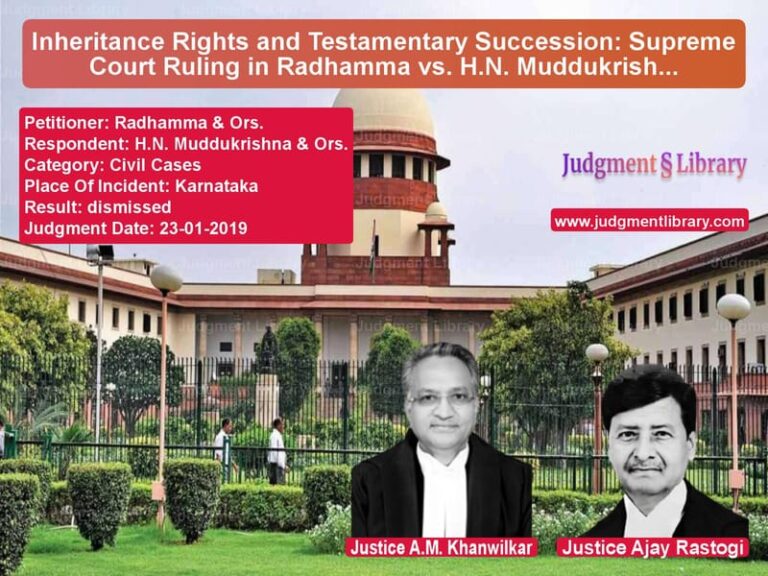Customs Valuation and Under-Invoicing: Supreme Court Verdict on Import Price Dispute
The Supreme Court of India recently delivered a significant judgment in a customs valuation dispute involving allegations of under-invoicing and customs duty evasion. The case, Commissioner of Customs (Imports), Mumbai v. M/s Ganpati Overseas, revolved around whether the enhancement of the value of imported goods and the penalties imposed by the Commissioner of Customs (Adjudication-1), Mumbai, were justified.
The appeals, filed under Section 130-E of the Customs Act, 1962, challenged the order of the Customs, Excise, and Service Tax Appellate Tribunal (CESTAT), which had set aside the enhanced customs valuation and penalties. The case involved detailed discussions on the evidentiary value of export declarations, the validity of statements recorded under Section 108 of the Customs Act, and the proper application of customs valuation rules.
Background of the Case
The case originated from a show cause notice issued by the Directorate of Revenue Intelligence (DRI) on December 17, 1999, to M/s Ganpati Overseas, a firm owned by Yashpal Sharma. The DRI alleged that the company had imported tuners and saw filters from Hong Kong at significantly under-invoiced prices, leading to a substantial evasion of customs duty. The key elements of the allegations were:
- M/s Ganpati Overseas had imported twenty consignments of tuners and saw filters from M/s Arise Enterprises, Hong Kong, between 1997 and 1999.
- The declared value of the goods in the import invoices was significantly lower than the value declared in the export declarations filed by M/s Arise Enterprises with the Hong Kong Customs authority.
- The imports were made through the Air Cargo Complex in Mumbai, and M/s National Shipping Agency acted as the Customs House Agent.
The DRI obtained information from the Consulate General of India in Hong Kong, revealing that M/s Arise Enterprises was owned by Suresh Chandra Sharma, the co-brother of Yashpal Sharma. Investigators suspected that the two had conspired to under-invoice the imported goods to evade customs duty.
Evidence Presented by the Customs Authorities
The Customs Department relied primarily on the following evidence to support its claim:
- Export declarations from Hong Kong Customs showed that the price of tuners was significantly higher than the value declared in the import invoices submitted in India.
- Statements recorded under Section 108 of the Customs Act from both Yashpal Sharma and Suresh Chandra Sharma, in which they allegedly admitted to under-invoicing.
- Charts prepared by the DRI showing that M/s Ganpati Overseas had evaded customs duty amounting to ₹1.16 crore.
- Physical verification of sales invoices showing that the goods were sold at much higher prices than the declared import value.
The DRI claimed that the price of tuners in the local market ranged between ₹200 and ₹325 per piece, whereas the import invoices declared prices between ₹40 and ₹60 per piece. This discrepancy suggested that a substantial portion of the actual transaction value had not been disclosed to customs authorities.
Response from M/s Ganpati Overseas
In its reply to the show cause notice, M/s Ganpati Overseas refuted the allegations, arguing:
- The export declarations relied upon by the department were unattested photocopies and could not be treated as reliable evidence.
- The supplier, M/s Arise Enterprises, had filed revised export declarations with Hong Kong Customs, correcting the initially declared prices to match those in the import invoices.
- The statements obtained under Section 108 of the Customs Act were recorded under coercion and were subsequently retracted.
- There was no independent evidence to show that remittances over and above the declared invoice prices were made to the supplier.
The company further contended that its imports were made at discounted prices under stock clearance sales, which explained the lower declared values.
Findings of the Adjudicating Authority
The Commissioner of Customs (Adjudication-1), Mumbai, rejected the explanations given by M/s Ganpati Overseas and upheld the customs authorities’ claim that under-invoicing had taken place. The key findings of the adjudicating authority included:
- The statements recorded under Section 108 of the Customs Act were voluntary and clearly demonstrated the intent to evade customs duty.
- The price declarations in the revised export documents from Hong Kong were an afterthought to evade legal consequences.
- The price of identical goods in contemporaneous imports was significantly higher than the declared price in the disputed consignments.
- The customs authorities were justified in applying Rule 8 of the Customs Valuation Rules, 1988, to determine the correct value of the goods.
The adjudicating authority imposed a penalty of ₹1.16 crore and directed the payment of differential customs duty. Additionally, a personal penalty of ₹5 lakh was imposed on Yashpal Sharma under Section 112(a) of the Customs Act.
CESTAT’s Ruling
On appeal, the CESTAT set aside the penalties and ruled in favor of M/s Ganpati Overseas, holding that:
- The department failed to establish under-invoicing with reliable evidence.
- The export declarations relied upon were unauthenticated and could not be treated as conclusive proof.
- The statements under Section 108 were retracted at the earliest opportunity, and there was no corroborative evidence to support the department’s claims.
- The customs authorities did not follow the step-by-step approach prescribed under the Customs Valuation Rules and unjustifiably invoked Rule 8.
Supreme Court Verdict
The Supreme Court upheld CESTAT’s decision, emphasizing:
- The burden of proving under-invoicing lies on the department, and suspicion alone is insufficient.
- Export declarations that were later corrected by the supplier and accepted by Hong Kong Customs could not be ignored.
- Statements under Section 108 of the Customs Act, if retracted, require independent corroboration.
- Customs authorities must adhere to procedural safeguards and cannot directly invoke Rule 8 without exhausting alternative valuation methods.
With this judgment, the Supreme Court reinforced the importance of adherence to procedural rules in customs valuation and the necessity of concrete evidence before alleging under-invoicing.
Petitioner Name: Commissioner of Customs (Imports), Mumbai.Respondent Name: M/s Ganpati Overseas through its Proprietor Shri Yashpal Sharma & Anr..Judgment By: Justice B. V. Nagarathna, Justice Ujjal Bhuyan.Place Of Incident: Mumbai, India.Judgment Date: 06-10-2023.
Don’t miss out on the full details! Download the complete judgment in PDF format below and gain valuable insights instantly!
Download Judgment: commissioner-of-cust-vs-ms-ganpati-overseas-supreme-court-of-india-judgment-dated-06-10-2023.pdf
Directly Download Judgment: Directly download this Judgment
See all petitions in Income Tax Disputes
See all petitions in Tax Evasion Cases
See all petitions in Banking Regulations
See all petitions in Judgment by B.V. Nagarathna
See all petitions in Judgment by Ujjal Bhuyan
See all petitions in dismissed
See all petitions in supreme court of India judgments October 2023
See all petitions in 2023 judgments
See all posts in Taxation and Financial Cases Category
See all allowed petitions in Taxation and Financial Cases Category
See all Dismissed petitions in Taxation and Financial Cases Category
See all partially allowed petitions in Taxation and Financial Cases Category







